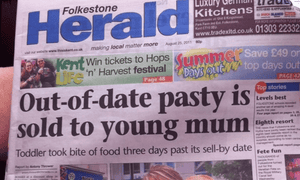Examples
- Rodney King, police brutality - 1991, Los Angeles
- Asian tsunami - December 2004, India/Bangladesh/Indonesia
- 7/7 bombings - July 5th 2005, London
- 2007 Virginia Tech shooting
- Bombings - November 2008, Mumbai
Theory (audience reception etc.)
- Surveillance
- Crowdsourcing
- Two step flow model?
Benefits to institutions
Institutions generally can't be everywhere at once, by utilising their audiences as citizen journalists, it gives them an upper hand in beating their competition as they would be able to break the news a lot quicker than other people.Benefits to audience
The power to make and break news has moved beyond the traditional news institutions. This has given audiences a huge amount of power, not even in terms of the fact that they can now choose what they wish to consume, they can have a huge impacting factor on what it is that they are consuming in the first place.Wider issues and debates
- Monetisation of free content
- User privacy would be a huge issue and debate
- Dumbing down society due to content that anyone can make anywhere anytime
SHEP
- Social - Use of social media rises a lot quicker and society becomes a lot more interconnected
- Historical - Digital revolution, fast rapid expansion and evolution one that has never been seen before in history
- Economical - Huge lasting impacts on media industries in economical terms as many traditional platforms would be going out of business due to the rise of new digital media
- Political - Politicians will tend to use UGC and new digital media as well as social media to their advantage to pander for votes
Citizen journalism means when the general public collects, reports, analyses and distributes news and information. Most commonly through the use of social media.
What was one of the first examples of news being generated by ‘ordinary people’?
One of the first examples of news being generated by ordinary people was back in 1991, when Rodney King was arrested and beaten by four Los Angeles police officers, this was all filmed and distributed by a near by onlooker recording everything on a camera phone that had become a lot more common. The home video footage made the news and was the focus for complaints for police officers and cases of police brutality.
List some of the formats for participation that are now offered by news organisations.
- Social media such as Twitter
- Comment sections on blogs
- Message boards such as forums
- Chat rooms
- Questions and answers
- Polls
User generated content footage tends to be a lot more raw and uncompromising. First-hand is often more emotive as it is a lot more closer to the scene compared to professionally shot footage which are almost always behind police lines due to regulations. Profesionally shot footage a lot more mediated and first hand UGC content is unmediated which audiences can experience a lot easier through news makes audiences relate to the the stories a lot more.
What is a gatekeeper?
A gatekeeper is someone or a process that results in news that is being sent for publication or distribution on any type of platform to be mediated or edited in one way or another to promote or reinforce a specific dominant reading.
How has the role of a gatekeeper changed?
Users and audiences are able to create content whenever they want and send it in as much as they want with little to no limits. This means it's up to the gatekeepers to turn the high frequency content into actual news in a way, rather than actually getting news and mediating it with preferred or dominant readings.
What is one of the primary concerns held by journalists over the rise of UGC?
Journalists have to worry about their positions at media institutions as it is very likely that in the future fewer and fewer trained journalists or staff at news organisations would be needed due to them going out from the rise in citizen journalism and social media.
Offer your own opinion (critical autonomy) on the following:
What impact is new/digital media having on:
- news stories - I believe that news stories have been diluted with weaker and soft news as the content no longer interests those with intellectual interests in terms of hard news with the increased usage of clickbaits and listicles.
- the news agenda (the choice of stories that make up the news) - The news agenda changes up quite drastically as they are a lot more focused on staying in business and revenues which mean they are more likely to focus on using soft news rather than hard news
- the role of professionals in news - Professional journalists no longer have the same power they once had in terms of holding the power and corrupt to account in the forms of investigative journalism.



